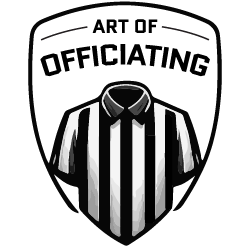In his 3-2-1 Thursday newsletter, James Clear wrote:
“If you’re having trouble sticking to a new habit, try a smaller version until it becomes automatic. Do less than you’re capable of, but do it more consistently than you have before.”
That’s solid advice for life, and it applies directly to football officiating.
Too often, we think improvement means taking on something big: We resolve to read the entire rules book in a week, watch two Hudl games in a day, or read the entire mechanics manual in a month. Those big goals sound good, but they rarely stick. By the end of the week, most of us are back to our old patterns.
The key is smaller, repeatable steps. Instead of doing everything at once, find one thing you can do consistently, then let the habit build.
We all want to know the rules book better. But telling yourself, “I’ll study a full rule tonight,” usually ends in frustration. Instead, try this: Pick one section each day. Read it. Highlight it. Ask yourself how it might come up in a game. 10-20 minutes is enough. Do it daily, and you’ll know the book better in a month than most officials who cram the night before the test.
The same goes for mechanics. Don’t try to absorb an entire chapter in one sitting. Pick one concept, say, scrimmage kick coverage, and read those pages. Let it sink in before moving on.
Film is one of the best teaching tools we have. But if you tell yourself, “I’ll break down three games this week,” you probably won’t. Start smaller. Watch one quarter of film. Focus on one thing: maybe blocks on the edge, or how wings handle forward progress. Take notes.
The next day, watch another quarter. That’s manageable, and it adds up. Before long, you’ve sharpened your eyes and increased your “snap count” without burning out.
Want to get better at working with your crew? Start by texting one official during the week. Send them a play you saw on YouTube. Ask what they’d rule. It takes 10 minutes, but it keeps you thinking about football between Friday nights. Next week, text another crewmate. Small actions keep you connected and learning.
Big promises fade quickly. Small habits stick. Consistency, not volume, is what creates growth.
Think about conditioning. If you run two miles every day, you’ll be in better shape than the guy who runs ten miles once a month. Officiating is no different. Fifteen minutes a day studying rules, reviewing film, or talking plays with a partner will do more for your growth than one marathon cram session.
Don’t let the idea of officiating improvement feel overwhelming. You don’t have to overhaul your entire routine. Instead, build small, repeatable habits: one rules book section a day, one quarter of film, one conversation with a crewmate. Do it consistently.
Like James Clear says, do less than you think you’re capable of, but do it more consistently than you ever have before. That’s how habits form, and that’s how officials improve.
Quiz
Read the quiz stem and then choose the best answer. This question is courtesy of the Redding Study Guide.
1/G at the B-9. B42 runs onto the field to replace B10. B10, realizing he won’t be able to reach his team’s sideline before the snap, leaves the field over the end line.
- Live ball foul. Enforce the foul from the previous spot
- Live ball foul. Enforce the foul from the succeeding spot
- Dead ball foul
Review Rule 3-7-2 and 3-7-2 PENALTY
